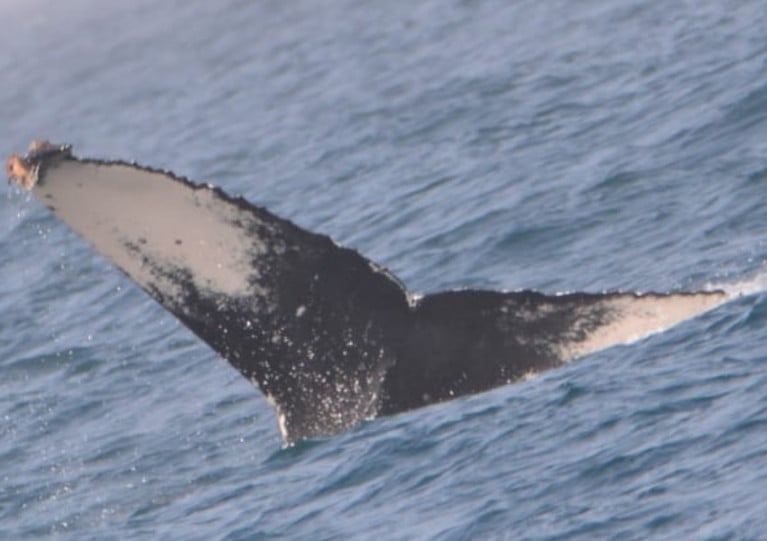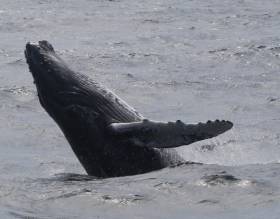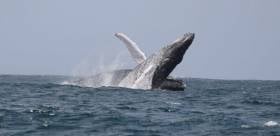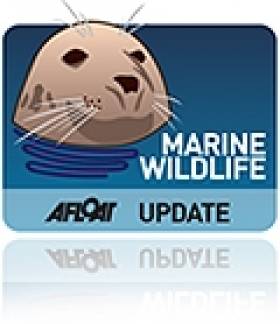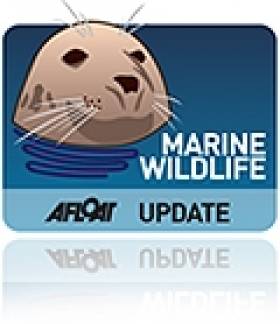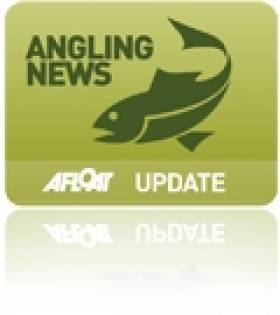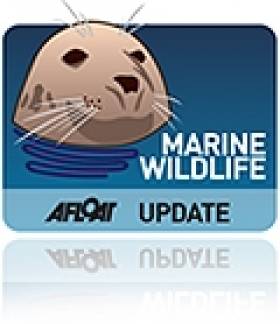Displaying items by tag: Cape Verde
Despite desktop research replacing field work during the ongoing Covid-19 pandemic, the Irish Whale and Dolphin Group recently made a breakthrough in confirming a second Irish humpback whale at breeding grounds off Cape Verde — following last year’s confirmation of what was long suspected by researchers.
The match with HBIRL78 — first sighted off Hook Head in January 2017 — was made in collaboration with Lindsey Jones of the North Atlantic Humpback Whale Catalogue and “suggests we were right to invest our time and energy into this archipelago”, writes IWDG sightings officer Pádraig Whooley.
Although there is little chance of any further trips this breeding season, with Cape Verde having shut down like much of the world to control the spread of the virus, the latest find will be encouraging when field work can resume in 2021.
“HBIRL78 may still be in the waters of Sal Rei Bay, Boa Vista, looking to mate or give birth, and if this is the case, it still has a long 4,250 km northbound journey ahead of it,” says Whooley. “It could of course have completed it’s reproductive mission, in which case it may be little more than a few weeks away from finding itself within scoping range of our southwest headlands.
“Whether of course we’ll be able to get out on boats to photograph it when it does return will be down to a much smaller and far less welcome organism. But given the current Covid-19 environment, I can think of nothing better for body, soul or mind, than to sit on a headland for a few hours and try to spot our returning humpbacks.”
IWDG Sets Sail For Cape Verde This Weekend On Latest Humpback Whale Research Mission
The Irish Whale and Dolphin Group (IWDG) sets sail this weekend for Cape Verde next month on its eighth humpback whale expedition.
Funded by the Island Foundation, this two-week mission comes just months after the IWDG finally confirmed the breeding grounds for Ireland’s regular humpback whale visitors near the west African island chain.
Cape Verde also appears to be a chosen spot for these marine wildlife giants from both ends of the earth, as a previous mission in September 2014 recorded humpbacks that usually feed in the southern hemisphere.
Next month’s mission, while building on this research, will also involve training local marine biologists in cetacean survey and research techniques “to empower them to take ownership of whale and dolphin conservation”.
Spanish research group Edmaktub will be providing its 47ft Lipari catamaran as a research platform for their work, updates from which will be posted to a dedicated Facebook page.
Sixteen years after the Irish Whale and Dolphin Group’s (IWDG) first attempt to find the origins of Ireland’s humpback whales, a chance excursion on the latest expedition to Cape Verde has finally revealed the breeding grounds for these threatened marine wildlife visitors.
It was long suspected that the waters around the island chain off West Africa were the most likely breeding area for humpbacks that have been sighted nearly 1,000 times and photographed ever 100 times in Irish waters over the last two decades.
But that wasn’t confirmed until this April during a two-week expedition, when on a trip to a known breeding spot in Santa Monica off Boavista, IWDG chief Simon Berrow photographed two humpbacks that surfaced near his boat.
One of these whales was identified by the group’s international network of experts as an individual sighted by Nick Massett off Kerry four years ago. It was just the match they’d been searching for.
“What a fantastic outcome for the IWDG,” said Massett at the news. “It was born out of the belief that the Cape Verde islands was the breeding ground for the humpbacks we have documented here off Ireland. But it is down to the dogged persistence of the expedition teams that have returned there over the years to prove the theory.
“I am delighted for Simon Berrow that he finally got the definitive proof of this connection, and pleased to have played my part in documenting the animal here off Co Kerry.”
Also celebrating the achievement was IWDG sightings officer Pádraig Whooley, who had been beginning to doubt whether they had been looking in the right place all these years.
“We’ve finally found a really important missing piece of the jigsaw,” said Whooley, “but it’s a very large puzzle, which still has lots of missing pieces.”
The next steps for the IWDG are to determine how to use this information to enhance conservation for the endangered species, perhaps involving a greater level of co-operation between the Irish and Cape Verdean governments.
Meanwhile, the group will follow-up this find with another expedition to Cape Verde this coming September.
Cork Screening For Humpback Whale Film
#MarineWildlife - A new film on a decade-long study of humpback whales in the Atlantic will have a special screening in Cork later this month, as The Southern Star reports.
The Humpback Whales of Cape Verde – which stars some of the marine giants that visit Cape Clear every year – will be shown to the public in a free event at Clonakilty Library at 7.30pm on Wednesday 27 January.
It following the work of Dr Simon Berrow of GMIT the Irish Whale and Dolphin Group (IWDG), who has been a part of annual marine science expeditions to Cape Verde for a number of years, studying the humpback whales of the islands off Western Africa – and their connections with West Cork, where the species is regularly spotted each summer.
Dr Berrow also featured on Afloat.ie this week for the new journal paper he co-authored on the threat of banned toxic chemicals in European waters to killer whales and other cetaceans.
Note: a previous reference to a screening in North Donegal was inaccurate, but dates of future library tour screenings for the film from February 2016 can be found HERE.
#MARINE WILDLIFE - Researchers with the Irish Whale and Dolphin Group (IWDG) have arrived in Cape Verde to continue their studies on the North Atlantic humpback whale.
In what is the fourth expedition by the IWDG to the islands off the west coast of Africa, Conor Ryan and Darren Craig will be collecting biopsy samples to study the whale's genetics and analyse for persistant organic pollutants in their habitat. They will also be recording whale song and collecting photo ID images.
According to the IMDG: "All these techniques are helping us to build up a picture of how isolated this population is, about the geographic range of these whales, and how large the population is."
Regular updates from the duo, including photos of local flora and fauna and marine wildlife, will be posted on their research weblog HERE.
New Season of Summer Whale Watching Courses on Cape Clear
#MARINE WILDLIFE - The Irish Whale and Dolphin Group (IWDG) has announced another series of its popular whale watching courses on Cape Clear in West Cork this summer.
The courses cater for adults keen to learn more about whales and dolphins in Irish waters and how to observe, record and identify them. They will feature a mixture of workshops and field trips, including cliff and boat-based whale watches.
Three weekend courses will take place on 25-27 May, 20-22 July and 7-9 September, led by IWDG sightings co-ordinator Pádraig Whooley. All are open to IWDG members and non-members alike, but places are limited to 20 places each weekend on a first-come-first-served basis.
Admission is €70 for IWDG members (€90 for non-members), with a non-refundable deposit of €25 required. Please note that this fee does not cover transport to Cape Clear, food or accomodation (which is limited in high summer) or any boat trips. As the itinerary will be weather-dependant, some flexibility will be required.
More information on the weekends and booking details are available at the IWDG website HERE.
In other IWDG news, the group has secured another grant from the Island Foundation to continue its humpback whale research in Cape Verde this spring and summer.
A shore-based team will be stationed in Boa Vista in an area that is "possibly the most important site for breeding humbacks in the entire northeast Atlantic".
Catching Your Dinner Off the West Coast
Deep sea fishing is alive and well off the west coast of Ireland, and not only is it a hugely enjoyable sport - just one catch can be enough to feed the whole family.
That's what The Irish Times' Elizabeth Birdthistle discovered in the last of her series on catching your dinner in Ireland.
Birdthistle set out for the waters off Inis Boffin with John Brittain, who has been skippering his angling boat Bluewater for 20 years for the charter fishing season between April and October.
The boat takes up to 12 anglers who are more than eager to pay €70 a head to catch large cod, pollack and mackerel in abundance. Even novices are welcome, as the fee covers all rods, tackle and tuition.
Squid and octopus are also on the cards, as are some larger quarries such as sharks and ray - though these can only be fished in a tag-and-release programme. Smaller catches also get thrown back to propogate.
"The biggest shark caught here weighed 150lbs," writes Birdthistle, "and, as with all sharks caught, Brittain must tread with caution to release the giant hook or else the shark returns to the deep with part of his hand.
"The tagged sharks have been caught as far away as the Grand Banks off Newfoundland and the Cape Verde islands."
The Irish Times has more on the story HERE.
Post Mortem on Mass Pilot Whale Strandings Cancelled Due to Bad Weather
Plans to carry out a post-mortem examinations on thirty-five Pilot whales found dead on a beach in Co Donegal yesterday have been cancelled due to bad weather according to Dr. Simon Berrow of the Irish Whale and Dolphin Group (IWDG).
Up to thirty-five Pilot whales were found dead on a beach in Co Donegal. The whales were discovered on Rutland Island near Burton port yesterday afternoon on a beach and have been confirmed as pilot whales, mostly mothers and calves.
A team from the Galway-Mayo Institute of Technology led by Dr Ian O'Connor and the Irish Whale and Dolphin Group are planning to travel to record length, gender and obtain photographs to see if they can be matched to the recently observed Scottish animals. Skin samples and teeth will also be collected for genetics and life-history studies.
According to locals the whales had been seen feeding in the area around Aranmore Island since Tuesday.
A group of around 30 pilot whales were monitored in South Uist in the outer Hebrides, Scotland last weekend for fear of their live-stranding. The IWDG believe it may be the same group.
Pilot whales have a tendency to strand themselves in large numbers and a similar incident occurred in Co Mayo a few years ago. In June Cape Verde islanders abandoned hope for the survival of 92 pilot whales that were found washed up in a mass beaching. In September in New Zealand at least 25 pilot whales died after beaching themselves in a north Wellington bay as rescuers battled to save almost 50 more stranded.
RTE News has pictures HERE



























